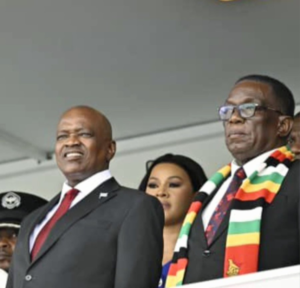MNANGAGWA’S STRATEGIC DOMINANCE OVER ZIMBABWE’S FINANCIAL LANDSCAPE

President Emmerson Mnangagwa’s recent maneuvers in Zimbabwe’s financial sector mark a decisive move to consolidate power. By placing close allies in pivotal positions within the country’s financial architecture, Mnangagwa has effectively gained control over crucial aspects of the nation’s economy. The appointment of his business ally, John Muyashavanhu, as the Reserve Bank of Zimbabwe (RBZ) governor, alongside George Guvamatanga, the Finance permanent secretary, and his son, David Kudakwashe, as deputy Finance minister, signifies a strategic alignment of power within the Treasury.
This consolidation extends beyond mere appointments. Mnangagwa’s influence is evident in the controversial commandeering of state enterprises and public assets into the Mutapa Investment Fund (MIF), bypassing constitutional and legal processes. This move exemplifies his far-reaching control over public affairs, raising questions about governance and transparency.
The president’s reach has further extended into the banking sector, particularly with CBZ Holdings, Zimbabwe’s largest financial institution. Plans to merge CBZ with other leading financial entities like ZB Financial Holdings and First Mutual Holdings Limited aim to create a financial powerhouse with significant regional influence. This initiative, spearheaded by American banker Marc Holtzman, former CBZ chairperson, could reshape Zimbabwe’s financial landscape, but also reflects Mnangagwa’s overarching influence in economic matters.
These developments, while potentially streamlining financial services, are not without controversy. Critics point to a pattern of favoritism and patronage, arguing that these appointments and mergers prioritize loyalty over merit. This approach echoes the strategies of former president Robert Mugabe, who also relied on positioning allies in key roles to maintain control. Such tactics risk perpetuating clan-based politics and ethnic tensions, overshadowing the need for diverse and inclusive representation in government and public institutions.
Mnangagwa’s recent cabinet appointments and civil service deployments further illustrate this trend. The systematic placement of individuals from his ethnic and regional background in strategic positions has sparked concerns about the ‘villagisation’ of government, a term used to describe the ethnicization of state institutions. This approach, while consolidating political and ethnic supremacy, can undermine the principles of diversity and national unity.
In summary, President Mnangagwa’s control over Zimbabwe’s Treasury and financial institutions is a calculated move to reinforce his political power. While it streamlines financial operations and may bring economic efficiencies, it raises significant concerns about governance, meritocracy, and ethnic diversity in public administration. The long-term implications of these strategies on Zimbabwe’s economic and political landscape remain to be seen.



